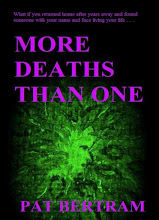Plot without characters to give it life is merely a recitation of activity, and characters without plot to give them meaning go nowhere. The best way to learn about your characters is to throw them into the plot and see what they do, what they say, and what they think. In this bizarre merry-go-round called fiction writing, however, characters drive plot, which means that you need to know who your characters are before you can begin figuring out where they are going.
I have always had a general idea of who my main character was before I started writing a novel, but I have never created a history or a full-bodied character sketch for him or her beforehand. Although the writing experts say such a sketch is necessary, I never saw the point in generating material I would not use. But since I am getting nowhere with my latest writing venture, I thought I would try it. See where it leads.
I decided the hero is going to be a man. Originally I had planned on a woman, but as I said in an earlier post, the man has the stronger story and the more poignant choices to make, so he will make a better point-of-view character. For purposes of this sketch, I will call him Chip.
What I know so far about Chip's history is that his mother is overbearing and interfering. Though she lives only an hour away, she came to visit and stayed for months. He hates himself for being a wimp and not kicking her out, but she is his mother, after all, and she has no one but him - his father ran out on them when Chip was in grade school. The story begins (and the world begins to end) the night Chip asks his mother to leave.
Chip is thirty-three, the owner of a pet store, and currently without a girlfriend. Perhaps he is leery of a relationship, not wanting to end up with someone like his mother. Other than that, I'm not sure I want to get into his background. Do we need to know where he went to school? What his childhood was like? What his failures and lost opportunities were? Do we care about his politics, his beliefs, his travels, his ex-girlfriends? Seems boring to me, and I can't see that it makes any difference when the world is ending.
Most books on writing say that an interesting and enduring character must have a strong desire, a goal he will do anything to achieve, but do Chip's present desires really matter when everything is about to change? To begin with, Chip's only desire is to get his mother out of his apartment, though later he will want desperately to escape the human zoo where he has been incarcerated. Is that enough to propel the story? Or do I need to give him another desire, one that he has at the beginning and that follows him throughout his adventures, until at the end he gets either what he wants or what he deserves?
I'll have to think about that and get back to you.
I’ve always enjoyed working with my hands to create original art pieces and
because I’ve tried quite a few different areas of art, I rather quickly
realize...










No comments:
Post a Comment